Performing artists are such punctilious critics of their own work that they generally know what went well and what didn’t. Even before anyone else weighs in, they have at least a “feel” for how it came off. But eventually they’re curious to know what it looked like from the “other side of the footlights,” and most have a cadre of friends, family members, or colleagues whose opinions they trust will be honest and constructive.
We asked a number of Kansas City performers about their “go-to” voices. Whose viewpoints do they value most, other than those in the press (a subject best reserved for another occasion)? Who within their circle can they trust to assess their work astutely, and how does that impact their creative development? The variety of responses we received was striking.
William Baker, founding director, William Baker Festival Singers:
“I do have two people who I trust to give me knowledgeable, well-informed and brutally honest feedback: My wife, Laura, does not hold a music degree, but she has been an exceptionally accomplished musician her whole life. She has a thorough understanding of the potential for the ensemble, for me, and for each event. She never fails to give me a candid assessment of the performance on the level of tuning, balance, expressiveness, spirituality, audience response and how memorable it was. … The other person is my executive associate, Jamea Sale, a consummate professional and a PhD candidate in choral pedagogy at KU … who knows my work as well as anyone. She is also professional, supportive and brutally honest. Often Laura, Jamea, and I will have lunch after big events to thoroughly assess and debrief. I realize that very few of my colleagues have this enormous advantage.”
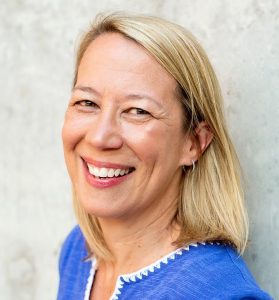
Kathleen Smith Belcher
Danny Belcher, baritone and director, artist diploma/voice program, William Jewell College:
“Artists are their own worst self-critics. However, I do have a sounding board made up of my wife (Kathleen Smith Belcher), my manager, and even my daughter. I always value her honesty about what she liked and didn’t like. You need honesty in both success and failure. I do trust my conductor, fellow colleagues and director, too. But, I am kind of an open book that way.”
Kathleen Smith Belcher, stage director, Metropolitan Opera staff member:
“In the preliminary, conceptual process that we directors are frequently involved in, I will often bounce my ideas off my husband, Daniel Belcher. Being an opera singer, he usually understands the inherent challenges, the piece of music, time and money constraints, etc. He has often looked at me incredulously when presented with a crazy idea and he will seriously consider all sides before looking at me and saying, no! … The other person (and this varies from project to project) I rely on is my lighting designer. The lighting designer is involved in the pre-planning, but I think he (or she) has a unique perspective. … I rely on them to tell me if any of the storytelling is unclear, or if they think jokes are landing or not landing. After watching rehearsals for weeks, it’s hard to tell if comedies are really funny, or if we artists are just amusing ourselves!”
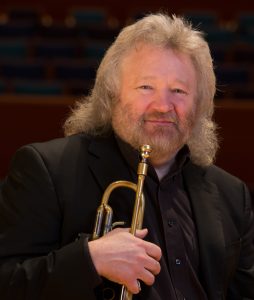
Keith Benjamin
Keith Benjamin, professor of trumpet, UMKC Conservatory:
“Very easy to answer, for me: My brass colleagues at the Conservatory, most particularly Tom Stein, who I believe is one of the most amazing musicians out there that no one’s ever heard of. He’s honest, blunt, and articulate. Also, as a bonus, we’ll end up laughing our heads off about whatever we talk about. … I also will ask my wife. She’s heard me play daily for 30 years (poor thing) and has a slightly different angle on all this because she’s a singer. She’s said a number of things to me after performances in the past that made me completely puzzled at the time, but later … I have face-palmed about how obviously spot-on she was. My students have also done the same thing. Trumpet-plus-different-perspective can be amazingly edifying.”
Beau Bledsoe, artistic director, Ensemble Ibérica:
“First of all, hearing an honest negative criticism has to be one of the most valuable gifts an artist can receive. This is the reason I asked Bill Cutler to be the Ensemble Ibérica board president. He would often come up to me after a concert and tell me what he thought. … Bill is always very polite and sensitive, but his feedback is so helpful to me. … I also deeply believe that an ensemble needs to be able to fight with one another. The artists need to be able to politely advocate for what they strongly feel without being abusive. This makes for a longer rehearsal but it results in a more positive group ownership of the music.”

Nathan Bowman and Elizabeth Bettendorf Bowman
Elizabeth Bettendorf Bowman & Nathan Bowman, directors, Kansas City Public Theatre:
Elizabeth: “Other than Nathan, who is my most valued sounding board, I appreciate feedback from audience members who did not intend to see, or have never seen, theater and just happen upon our performances. More often than not they have the most genuine reactions of anyone in the room.”
Nathan: “Besides my spouse and co-founder, Elizabeth, who knows my artistic mind better than anyone, the person I discuss art with the most is my close friend and musical collaborator, Mike Pittman. He always offers a well-informed and nuanced perspective and I would listen to his opinion over most others.”
Charles Bruffy, Grammy Award-winning artistic director, Kansas City Chorale: “Our primary goal is that when our audience departs, they will have felt something. I do my best to hear and accept the comments of every person who passes by, but then I ask (Artistic Assistant) Patrice Sollenberger and Don (Loncasty) …and I get the low-down on the entire concert. … As far as people whose ‘voices’ I trust … in my youth of course there were people helping me develop my brand of conducting, people like Eph Ehly. Now … I can absorb the input of people who know the craft as well as I do. My biggest inspiration, teacher, and mentor was Robert Shaw, and to this day after a performance or recording (I) think ‘I wonder if Mr. Shaw would approve.’ ”
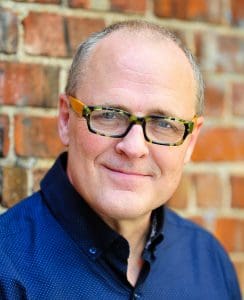
Jeff Church
Jeff Church, producing artistic director, The Coterie Theatre:
“At The Coterie Theatre, we have a practice known as ‘designer run-through.’ This means the design team assembles to watch the fully blocked show in rehearsal for the first time. Key staff members are also there. These folks give me feedback and they shape how I’ll proceed to make the show work.”
Hillary Clemens & Matt Schwader, actors and artistic board members, Kansas City Actors Theatre:
Hillary: “I am not someone who finds criticism useful after a show has opened (unless it’s notes from the stage manager), and in rehearsals I try to put my trust as completely as possible in the hands of the director. I do, however, appreciate it when my husband can see a run before opening night. He knows me, as a person and an actor, better than anyone, and he really knows what works (and doesn’t) onstage. … He’s the one I know will always be able to offer a smart, productive, and truly supportive perspective.”

Hillary Clemens

Matt Schwader
Matt: “I echo Hillary’s comments almost exactly. Once the performance has left the rehearsal phase and moved into regular performances, I don’t have any interest in getting more input on the work. At that point it is time to play. While in the rehearsal process, I rely almost entirely upon the director and my scene partners for collaborative input. Acting is a collaboration and there isn’t much I will do entirely on my own out there. I need to trust my director and scene partners and they need to trust me. Hillary might be the only ‘outside’ eye that I trust enough for input, but only because she knows how I work on a very intimate level.”
Ed Frazier Davis, composer, Kansas City Chorale baritone:
“Whenever I seek completely honest feedback, whether it be for a composition I’m working on or a performance I’ve given, I look to my father (conductor Sir Andrew Davis). As a greatly accomplished musician, he holds himself and those with whom he works to the highest standards, and his respect for the art of music is such that he never sugarcoats his musical opinions, even when it comes to his own son. It’s one of the many things I admire so much about him, as his feedback has proven invaluable to the success of my work countless times.”
Sidonie Garrett, executive artistic director, Heart of America Shakespeare Festival:
“I have a small group of long-time confidants, some of whom are colleagues, each with a viewpoint and life experience that is specific to their own work and lives, who will always give me feedback that is honest. This group includes an actor, director, health professional, writer, producer, teacher, brewer and musician. And their honest responses are most helpful in work that I do going forward, as I bring that feedback with me and use it to be a better storyteller.”

Sascha Groschang / Photo by Gary Roman
Sascha Groschang, freelance cellist and founding member of The Wires:
“In general, after a performance I want people to lie to me, or at least keep it as positive as possible. I know how I felt about the performance, and it’s already gone, already in the past, and there’s no chance for change, no take-backs, nothing to do but accept what happened, for the good or the bad. If I feel it went poorly, I will obsess over it for a time. … However, I do like to have feedback in preparing for a concert, especially with new works that I’m feeling unfamiliar with or especially vulnerable with. My favorite people to ask are two non-classical musicians: my husband (who is a sound engineer, and listens to music with very different ears), and Steven Eubank (who is an actor/director). Both have a fresh musical view, unencumbered by years of picking apart every technical aspect. … They also are better at listening to the piece more as a whole picture.”
Jan Kraybill, organist, Kauffman Center for the Performing Arts, Community of Christ Headquarters, Village on Antioch Presbyterian Church:
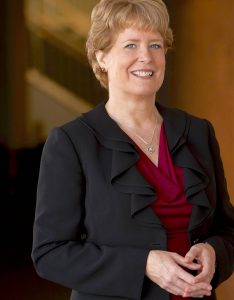
Jan Kraybill / Photo by Peter Obetz
“The voices that are most valuable to me when evaluating my own performances are in two categories: (1) honest musician mentors and colleagues whose artistry I admire, and (2) honest non-musician family and friends who support and attend many types of musical performances, not just mine. The musicians help me improve by focusing on technical issues. The non-musicians help me improve by focusing on the relationship to the audience.”
Cynthia Levin, producing artistic director, Unicorn Theatre:
“We all need friends and colleagues who are smart, who know us and who we can trust to tell us the truth and help us navigate our life and our art. … I have several. It is impossible to live well and work as an artist without collaboration on many levels. My closest friend, Cheryl Benge, who I have known for 35 years is one. She used to be involved in theatre so has a great understanding of what it feels like to be an artist and musician and knows me probably better than anyone else. … My colleagues such as Sid Garrett, Ted Swetz, Jeff Church, and Damron Armstrong are but a few who share the trials and tribulations of navigating the running of an organization. … On my staff, everyone has a voice and input into the Unicorn but my three cohorts, Ian Crawford, Em Swenson, and Jason Kralicek are invaluable. … Some things I must do alone but I have always felt that by surrounding myself with the best people, it cannot help but make me a better person and therefore, a better artist.”
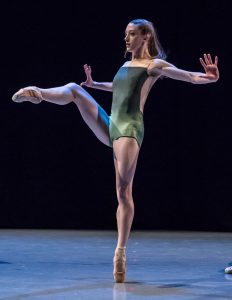
Taryn Mejia / Photo by Brett Pruitt & East Market Studios
Taryn Mejia, company dancer, Kansas City Ballet:
“In all honesty I am my biggest and worst critic. I painstakingly analyze each step and line and then go back and think about emotional intent and what I want to portray in that moment. … However, I have come to rely on the artistic staff and many colleagues to help me when I am struggling with a particular section or maybe I needed to have a different approach or change the artistry in a moment. … When you are dancing you can only see so much in the mirror, you need others to help you complete the whole picture. … You quickly learn who will be honest with you and who will just say, ‘it was great,’ after every run. … I would rather have an honest opinion in rehearsal, so I can make something the best it can be, than to get onstage and later see a photo or video and be disappointed with myself.”
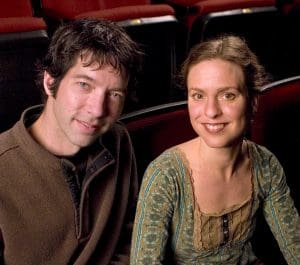
Brad Cox and Jennifer Owen
Jennifer Owen, founding co-director, Owen/Cox Dance Group:
“This is an easy one for me to answer: It’s Brad Cox! He’s always honest and I always trust his opinion. I value his opinion more than anyone else’s. I also rely heavily on our rehearsal directors, Christine Colby Jacques and Marcus Oatis. I value opinions of my colleagues, other artists, the dancers I work with, friends, and family as well.”
John Rensenhouse and Darren Sextro, directors and artistic board members, Kansas City Actors Theatre:
John: “I depend most consistently on the audience to let me know how I’m doing. There’s a sense in the room, a feeling of captivation and suspension when things are working. And it’s easy to tell when things aren’t. … I also get notes from my husband, Darren, and I pay very close attention to those.”
Darren: “I honestly and always try to see my directing work through the eyes of the original creator, the playwright. For contemporary playwrights, which is most of what I work on, if I’m having trouble visualizing her or him, I’ll watch archived interviews or lectures: even better, if the playwright is discussing the origins of that specific story. Then when I’m struggling with directorial decisions, I can try to access that voice.”
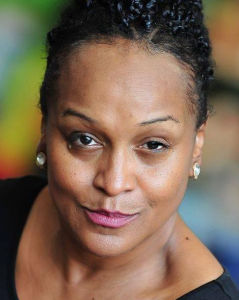
Sherri Roulette-Mosley
Sherri Roulette-Mosley, actor:
“Although I truly value working with a director whose voice I can rely on with confidence, my go-to voice that I trust and respect when I need help with clarity, or confirmation on whether specific character choices I’m making feels authentic, is my fellow actress, director, and dear friend, Lynn King.”
Matthew Christopher Shepard, executive and artistic director, Te Deum:
“For frank opinions about the quality and how to improve the quality, I most trust my collegiate professor, Arnold Epley. But in general, my concerts and my art are for the general public, not the specifically studied. If I’ve impressed the musicologists but failed to move the audience, I’ve wholly missed it.”

Jackson Thomas
Jackson Thomas, founder and artistic director, KCVITAs:
“From a conductor’s point of view, I seek out many peoples’ advice or affirmation, those who represent a member of the ensemble (often by best friend, Kirsten Hyde), a composer (often Leslee Wood), and audience members who are willing to give me more details (John Schaefer and others). Conducting-wise, Mariana Farah, my mentor, has always been a go-to. From a singer’s perspective … I add those whom I trust as humans as well as musicians, like Stella Dayrit Roden and Joyce Castle, as well as Nanette Kraus, a pianist with whom I work often. In all cases, I welcome their brutality in feedback because it grounds me in more objectivity and I can trust there is no ill intent.”
—By Paul Horsley
To reach Paul Horsley, performing arts editor; send an email to paul@kcindependent.com or find him on Facebook (paul.horsley.501) or Twitter (@phorsleycritic).